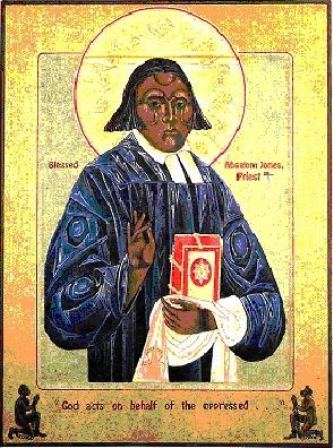
Set us free, heavenly Father, from every bond of prejudice and fear; that, honoring the steadfast courage of your servant Absalom Jones, we may show forth in our lives the reconciling love and true freedom of the children of God, which you have given us in your Son our Savior Jesus Christ; who lives and reigns with you and the Holy Spirit, one God, now and for ever. Amen.
– Collect from Lesser Feasts and Fasts, 2003
REFLECTION
I first heard of Fr. Jones a few years ago during the beginning stages of my journey on the Canterbury Trail. I began researching the African Methodist Episcopal (AME) Church and read about Bishop Richard Allen. This research then lead me to Fr. Absalom Jones. Fr. Jones’ story is an amazing one. Being born a slave, then obtaining his freedom, earning an income so he can buy his wife’s freedom is an amazing feat.
Fr. Jones, along with Bishop Allen were initially Methodist ministers in Pennsylvania at St. George’s Methodist Church. When I visited the church, the following story was relayed to me:
The church was segregated. Allen and Jones were the pastors of the Black congregation and held services at a different time slot. If there was a joint service between the Black and White congregations, the Blacks would sit in the balcony. One day, while the church was empty except for the church secretary, Jones and Allen both walked down the isle and prayed at the altar. The content of their prayer is speculated but some suggest that it was due to the racism that they were facing at that time and their next steps as clergy caring for the flock entrusted to them. In the midst of their prayer, the church secretary came running down the isle demanding them not to pray at the altar and “ordering” them never to to do, even if the church is empty. That was the end of both Jones’ and Allen’s affiliation with the Methodist Church.
I’m not sure how true this account is. I’m inclined to believe it more so due to the source, a Philadelphian church historian. Regardless, the rest is history. Richard Allen went on to establish the AME Church. Fr. Absalom Jones went on to find the African Episcopal Church of St. Thomas. Afterwards, he and his congregation join the Protestant Episcopal Church of the United States (The Episcopal Church). St. Thomas was the first Black church in Philedelphia.
Fr. Jones is an inspiration to many Black priests, ministers, and elders. A new colleague of mine who is Episcopalian (and preached a really good sermon on Fr. Jones last Sunday night) and I may have differences of theological opinion, but the one thing we do agree on, is the place of Fr. Jones in the history of Black clergy. Fr. Jones should be a inspiration to all clergy for his resolve, his determination, his desire for unity, and his steadfast faith.
– Fr. JMH

Leave a comment